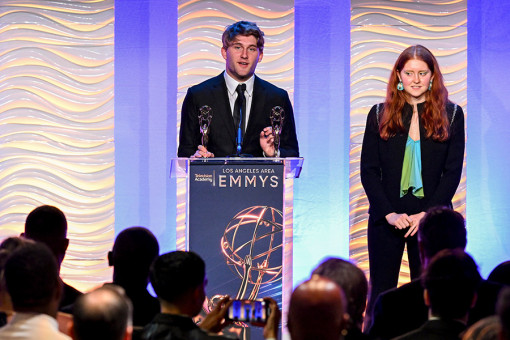DEAN TAUCHER
• Production designer, Law & Order: Special Victims Unit, NBC • Hired in 1999
• Now in his 19th season
I joined the show in the middle of the first season. The first 11 seasons were based in New Jersey; then they took over the space [at Chelsea Piers in Manhattan] where Law & Order was shot. We inherited the courtroom set. I've redesigned the squad room three times. Three seasons ago, I did a major freshening up, so it didn't look like New York in the 1970s.
I kept a lot of the floor plan; it was mostly surface looks and color changes. I don't use any computer software to design — I use my pen. But I'm dependent on my graphics department, which didn't exist at the start of the show. With the greater use of computers in society, we use them on the show. Now I have two full-time graphic artists to generate [images] on the computer screens, along with general labels and signs.
We've had the same core crew in the art department and construction department for 10 years or longer. Everyone knows who's strong [in a particular area] and who's doing what, so hopefully, there are no surprises. What has been interesting has been watching people start as assistant directors who are now producers. I've watched [star] Mariska [Hargitay] grow from a wonderful actress to a talented director.
As a freelancer, knowing that you're coming back to a new season and having a vacation, as opposed to being unemployed, is a special blessing. People ask me, "Aren't you bored?" Every episode takes you to a new place and a new world. It's always interesting. There's always something new to do.
CHARLES CIUP
• Technical director, Dancing with the Stars, ABC • Hired in 2006
• Now in his 25th season
• Won four Emmys for DWTS and one for NBC's Hairspray Live!
I started in season two, when I did half the season, and I'm still here. I switch all the cameras and create special effects. I'm beside the show director in the control booth, at a big panel with hundreds of buttons that represent the cameras, tape machines and servers and allow me to execute effects like flying something around on the screen.
Every time you see a different angle on the set, that's me pushing a button to select a camera, according to what the director has scripted or is calling out.
When I started, it was a much simpler show. It's grown more complex. The dance floor is bigger. We had 10 cameras and one video control person. Now we have 16 cameras and two video control people. We have LED screens now — we've hired a second technical director just for the screens. The producers and dancers have gotten more creative. For the choreography, a dancer might say, "Wouldn't it be fantastic if we had a rainstorm?"
The most significant change was going from standard definition to high definition, about 10 years ago. We had to learn new equipment — the way to compose shots and the amount of information coming was huge for us.
In all these years, Marie Osmond's fainting [after a samba performance in 2007] definitely stands out for me. And one night, 30 seconds to air, the switcher froze. It's run by a Windows interface — you have to reboot, which takes three minutes. I had a low-tech emergency switcher. We used that for the opening, and then took an early commercial break. You could hear a pin drop in that booth.
PETER CHAKOS
• Picture editor, The Big Bang Theory, CBS • Hired in 2007 with the pilot • Now in his 11th season
• Won four consecutive Emmys, 2014–17 • Also serves as coexecutive producer
Every show has its growing pains the first couple of years. Now I know what the pace is, what cuts to use. As you go, you get fewer notes, and it takes less time.
I have an Avid [editing setup] at home. I can bring a drive home and edit two days a week there. I like to get the show in one piece — it's easier to get the flow. There's a rhythm, a music to a sitcom. I like to make sure it happens.
The work is still the same. You're still putting together a show, cutting out time. On a long-running show, the days get shorter for a lot of people. We used to do a run-through on Friday. Now we do that only if, say, the writing changes on the Thursday run-through are going to be significant.
It's felt great to win four Emmys in a row. It took me so long to break my losing streak [which included eight editing noms for NBC's original Will & Grace]. What I really wanted was to leave something for my kids.
Being on a hit show, you don't have to look for work — you make your three-year deal and lock that in. There's more of a cachet to being on a long-running hit show. It's nice to be a guy on The Big Bang Theory rather than a guy on a show that lasted six episodes. One time, I was booking a trip to
Hawaii, and the person on the phone recognized my name. They upgraded my room.
This article originally appeared in emmy magazine, Issue No. 3, 2018
















